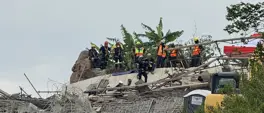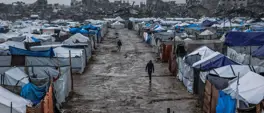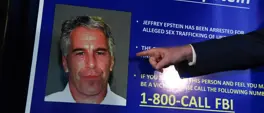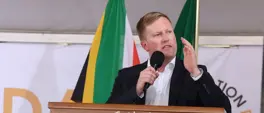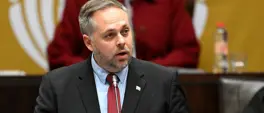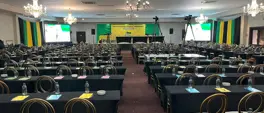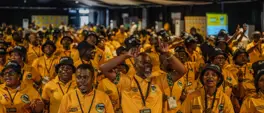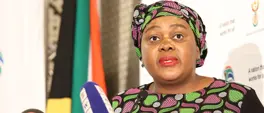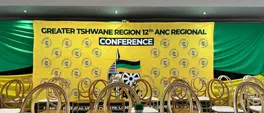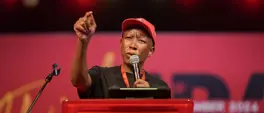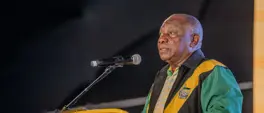Rebel singer Thandiswa Mazwai dissects migration, encourages SA to reclaim its freedom from 'lawless politicians'
Vukile Dlwati
11 May 2024 | 9:17Thandiswa 'King Tha' Mazwai is in conversation with Vukile Dlwati about how 'power corrupts', the controversy of migration and 'lawless politicians' who will never safeguard the freedom of citizens.
JOHANNESBURG - Thandiswa Mazwai at 48, represents many things: a mother, a storyteller, intentional and in her own words, a rebel singer.
Hers is a career that spans decades and, in some ways, mirrors South Africa's 30 years of democracy, which has seen her evolve from being in different musical bands, to producing her own work where she explores several themes facing society, but also fiercely shares her perspective with the world.
Right now, Mazwai, otherwise known as "King Tha", seemingly feels the burden of being the grown-up in the room. She released her much anticipated fourth studio album this week, Sankofa, a name derived from Ghana's Akan tribe, meaning reclamation, and comes as her first solo offering Zabalaza marks its 20th anniversary.
'POWER CORRUPTS '
In a sit-down with Eyewitness News, Mazwai shared her thoughts on the current state of the country and how artistry, no matter how it is perceived, will always be the window into circumstances facing society.
"The last 30 years has shown us that, indeed, power corrupts… absolute power corrupts absolutely," she remarked when thinking about South Africa, three decades into democracy.
She sounds like many others, who have become disillusioned with the country's democracy project and while she admits she feels less optimistic now, hers is a call for accountability and for heightened participation in the country's democratic project for citizens in the face of the hopelessness, unemployment and prevalence of substance abuse.
"Right now, there's a greater vigour, there's a greater sense of the responsibility to hold on to this freedom, because we realise that the politicians will not keep it for us, they will keep it for themselves," she said.
Again, Mazwai’s voice, her perspective, her fellowship or the sharing of her gifts, is well-timed, as her work, which speaks of the daily struggles, politics and trauma facing many, comes as the country prepares to go to the ballots on 29 May that for many, is an opportunity for a reset or to at least attempt to arrest the downward trajectory South Africa has been experiencing.
Sankofa comes with the much talked about song, Kulungile, aimed at addressing childhood wounds, which the artist also feels, when it comes to this subject, is only deepened for the country.
"I think the trauma actually gets worse… this dream deferred adds to the layer of trauma that, especially black South Africans, are experiencing because there was a bone of hope and that hope has been dashed."
In another song, Emini, also on Sankofa, she cries out to struggle stalwart Mama Winnie Mandela about thieving parliamentarians.
She sings: "Amasela akaphumi ePalamente. Siphethwe nagamasela thina. Oh, ngamasela mamaWinnie! Sibhuqabhubhuqana namasela thina aph’ekhaya." [These thieves are not leaving Parliament. We are ruled by thieves. Oh, thieves mamaWinnie. We are busy battling thieves here at home (South Africa).]
To observe the collective trauma of South Africa, points out Mazwai, one must look at the social status quo.
"In my personal life, in my family, most people don't have jobs, most people are heavily depressed and so they are drinking… so many of my family members who are living ekasi [in the township] - that’s their lifestyle… you're unemployed, you're depressed, you're drinking, you're doing drugs, you've been to prison, you don't have any hope and that's why we say to each other 'uzoba strong' [you’ll be strong] because you have nothing and the only thing you can do is be strong and that's a tragedy for black people in this country."
'SOUTH AFRICA IS A LAWLESS COUNTRY'
Mazwai is extremely in tune when it comes to observing the convoluted layers that define South Africa today, including the hot-button topic of migration, which has been severely politicised by some seeking power this month.
Xenophobia means the fear of foreigners, she says, "but we don’t fear German foreigners, French foreigners, we don’t fear Portuguese foreigners, we don’t fear a white foreigner."
She says South Africa is dealing with an indictment much deeper than xenophobia.
"Afrophobia is really about economics, it’s about people struggling for sustenance, struggling for work and that there is huge influx of people from other parts of Africa and south-east Asia coming to South Africa to look for better lifestyles."
Mazwai attributes South Africa's lawlessness to enabling government officials and entities.
"We have to be careful at the language that we use and who we point the finger at. I would point the finger at government, government officials and the police system because they are the ones taking bribes at the border gates, they are the ones who take bribes so that buildings in the city can be taken over by criminals or drug lords."
The way that people from other countries enter South Africa illegally "is an indictment on our systems, not those people", says the self-proclaimed rebel singer.
"Because if you come to a lawless country, you are welcome to be lawless because South Africa is a lawless country. Our politicians are lawless, and if the politicians are lawless, it's very easy for everybody else to start thinking: 'How can we be lawless in order to survive?'"
"We're in a crazy place where our leadership has abandoned us such that all kinds of ills can fester in South Africa," she continues.
But for her, it extends beyond South Africa's borders, it's a sickness across the continent and an indictment on all governments.
And while younger artists have often been blasted for failing to emulate the works of their musical predecessors, who were said to be in tune with the politics of the times, the struggle for liberation in particular, Mazwai pours cold water over such views, instead suggesting that music, be it
Amapiano, or in whatever shape or form, is political, in what is being said or not said.
"I'm of the view that any artist who creates any work is making a political statement. Whether that statement is overt or not, whether that statement is about reflecting society, or showing or trying to expose society to new thinking," she says.
Get the whole picture 💡
Take a look at the topic timeline for all related articles.

